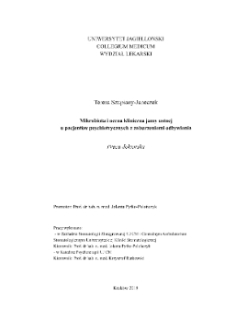Obiekt
Tytuł: Microbiota and oral cavity clinical evaluation in psychiatric patients with eating disorders
Abstrakt:
Eating disorders symptoms can cause numerous changes in the hard and soft tissues of the oral cavity. Bulimia and anorexia are not the only disorders causing symptoms present in the oral cavity. Aim of the study was clinical and oral microbiota evaluation of patients with eating disorders symptoms.The study group consisted of 60 patients treated at the daily ward Department of Psychotherapy University Hospital in Kraków. Patients with diagnoses of chapters F4.xx, F5x.x, F6x.x ICD-10, were included in the study were included in the study, based on answers given in Symptom Checklist ”O” Questionnaire. The control group of the same number was chosen similar in terms of sex and age. Dental examination including assessment of API, PUW, CPITN and additional tests in the form of oral swabs were taken for all patients at the University Dental Clinic. Studies have shown, that patients with symptoms of eating disorders more often had tooth erosions (it was found in 28.81% of cases). Correlation of erosion with symptoms of eating disorders has been demonstrated for several assessed symptoms of eating disorders present in the Symptom Checklist ”O”.The results of the microbiological examination showed more frequent occurrence of Enterococcus faecalis bacteria in the study group. Differences in the microbiological profile of the subjects was also found in relation to the control group. The l ; evel of oral hygiene of patients was assessed as sufficient or bad and it does not differ from the control group.General symptoms of mental background eating disorders cause microbiological changes in the oral cavity and promote the occurrence of a tooth erosion.
Miejsce wydania:
Stopień studiów:
Dyscyplina:
Instytucja nadająca tytuł:
Promotor:
Data wydania:
Identyfikator:
Sygnatura:
Język:
Prawa dostępu:
Kolekcje, do których przypisany jest obiekt:
Data ostatniej modyfikacji:
24 kwi 2025
Data dodania obiektu:
16 kwi 2019
Liczba wyświetleń treści obiektu:
147
Liczba wyświetleń treści obiektu w formacie PDF
31
Wszystkie dostępne wersje tego obiektu:
http://dl.cm-uj.krakow.pl:8080/publication/4263
Wyświetl opis w formacie RDF:
Wyświetl opis w formacie OAI-PMH:
| Nazwa wydania | Data |
|---|---|
| ZB-129168 | 24 kwi 2025 |
Obiekty
Podobne
Szupiany-Janeczek, Teresa
Musiał, Zofia
Pilecki, Maciej
Jankowska, Katarzyna
Ryba-Barwacz, Barbara

